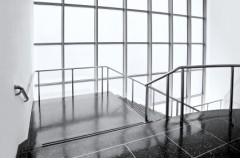29 November 2009
Short Novel: "Bauhausler" Conclusion
A story of Japanese woman who experienced Bauhaus art and love romance in Berlin, early 1930's when Nazis came to power.
Please read introduction first.
Auschwitz Museum in Oswiecim, Poland, November 2009
"Now let us read the will she left. It was also a letter to our museum."
The head of the museum said.
"It was 1991 when I came back to Berlin. A year after reunification of Germany. Berlin Wall was fallen down. People were pleased with new reunited Germany. After the war, I started a hotel management in Tokyo for foreigners because I spoke good English and German. Japan turned into democratic nation with new constitution. The first hotel I managed was very small one but as reconstruction and development of Japan underwent, my business expanded, I could own more and bigger hotels in Japan and later in other countries. Next thing I knew, I became a successful business woman. People call me "Hotel Queen." It seemed my life restarted after the war. I felt like I never had any life in pre-war era.
When I turned age of 80, I decided to retire. I've accomplished everything I thought I should. Last business trip for me was Berlin and Krakow. Chikano Hotel opened new franchises in reunited Berlin and the old capital, Krakow in Poland. About 60 years have passed since I left Berlin. The city experienced heavy bombing in second world war and division by the wall during the Cold War era.
The view and scenaries seemed to be drastically changed from my memories except Brandenburg Gate.
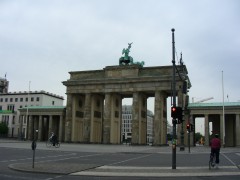
I stood at Brandenburg Gate recalling my old memories. I still remembered some of the things. Yes, Bauhaus. School, friends, Meisters. But it was almost fading away as I became very old. However, Bauhaus has been part of my life even after I left. I tried to acquire Bauhaus furniture and design in my hotels. It was simply because I liked that. After I attended opening ceremony at Chikano Hotel, Berlin, I left for Krakow. Very last franchise I visit before retirement. It was my first visit to Krakow. I was pretty much impressed by the city's beauty. I was so glad that such a beautiful city became my last business deal. After the opening ceremony ended, my career as hotel woman ended. So I decided to have first trip in my retirement. The place was there in Krakow. Local tour guide recommended me to visit countryside of the city, which was also beautiful, too.
Then the tour guide asked if I knew Auschwitz. I told him I heard about it before. He told me I should visit there because it was world's historic place. I knew how historic it was because I heard about what Nazis did to so many innocent people in the war. I predicted thing like that would happen even before the war stared because I did witness what happened. That was the reason I had to leave Berlin a very long time ago.
At first I entered Birkenau and looked around the concentration camp that had a railway station. The final desitination for the prisoners. They became prisoners not because of what they did but because of what they were like being Jew, Roma, or homosexuals. When they arrived, they were divided to go to gas chamber or cottage. Those who could work had to be survived for forced labor. They had to live in cottages like ones for livestocks. When they became useless, they were easily executed in gas chamber or shooting place or by any other brutal method.
I went to the museum exhibition in Auschwitz main building. I saw so many things such as hairs, trunks, prosthetic limbs, shoes taken from prisoners. Over one million were killed in this place. I was shocked and saddened. But I had to face most shocking thing in my life there. I walked on the corridor of the museum and saw the line-up of photo frames hanged on the wall. The guide told me they were all black and white prisoners face photos. Some of them had flowers on top of the photo frame. That was what the survival families left. I saw the photos passing by. All were shaved head and looked frightened. I had to stop by at one photo. I looked at it carefully and then fainted.
A few minutes later, I woke up and drunk a glass of water at the office room. I asked who he was. I was very sure but I wanted to confirm. Then the museum staff checked out and told me he was whom I knew. Meister Marcus Weiss. The record indicates he was arrested for treason in 1938 by Gestapo. After years of deportation to several camps, he was finally deported to Auschwitz and executed in 1943.
I recalled all my memories with him. From when I first met him at Bauhaus and aparted in my apartment. After I left Berlin, I desperately waited for him but I gave up and decided to live my life. I almost forgot him. But I finally saw him again. In such tragic way. I told my story regarding relationship with Marcus to the museum staff. They all understood how I felt. I decided to become a donor for preservation of this monumental place. The place no one should forget and anybody should know. Please know my story."
The head of the museum finished reading the letter. He seemed to be moved to tears because he knew Madame Chikano very well. He saw her several times before she passed away. He continued the speech.
"Madame Chikano indeed became major contributor for preserving the museum. She donated so much money to this museum while she was living. Because she had no relatives or family members, most of her fortune went into preservation of this museum. She will continue to be a major contributor of this museum."
The head of the museum smiled and pointed out a Wassily chair on the stage.
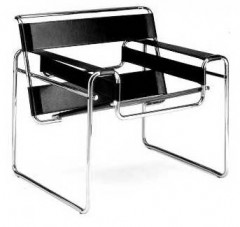
"Her experience symbolized paralell of Bauhaus and Auschwitz. Both German made. Germany-born Bauhaus was once banned by Nazis who built Auschwitz. It was revived in post war era in the U.S. by exiled Bauhaus Meisters. Bauhaus art concept became mainstream for modern design and architecture. Bauhaus school was gone but its concept and art survived and prevailed. Madame Chikano spent only for 5 months in Bauhaus but her life experience was like how Bauhaus went through. The chair was one of what she used in her office room. To commomerate her contribution, we would like to place this in this museum." He put bouquet flowers on it and said,
"Rest her soul in this place and Bauhaus."
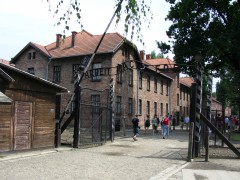
THE END!
This novel is copywrighted by this blog's manager, Masagata.
Next short novel would be "When East meets West" or "Fullbrightor" or anything else.
17:41 Posted in My novel | Permalink | Comments (0)
11 November 2009
Short Novel: Bauhausler, Chapter 8
A story of Japanese woman who experienced Bauhaus art and love romance in Berlin, early 1930's when Nazis came to power.
Please read Introduction first.
30 January, 1933, Adolf Hitler was appointed as Chancellor of Deutscheland Parliament. On that day, Masako witnessed Storm Troopers marching on the street singing Nazi-anthem "Horst Wessel Lied," carrying swastika banners and then shouted "Sieg Hail, Sieg Hail (Victory for us.)" It was a feaful scene.
Hitler's inauguration of Chancellorship was very shocking news for Bauhaus school teachers and students, who were preparing for upcoming Carnival event. Marcus took charge in stage interior and other teachers took charge in clothes, dancing, and music for the stage. Not just stage show but exhibition shows were prepared. Students were also involved in planning the Carnival event.
The purpose of the event was to gather donation from attendees and eventually get funding from rich sponsors. This was a great opportunity to appeal to the public how innovative Bauhaus art was. They were desperate because they were on the edge. Now Nazi took control of the country's politics. They hate Bauhaus. Whether they would be diminished or survived was uncertain.
Masako was chosen as one of dancers on the stage. Masako would perform Modern Bauhaus dancing combined with tradtional Japanese dances which she learnt from childhood. The theme of the stage show was "Tolerance." Using students from all over the Europe and the rest of the world, the show would tell how important it was to accept various cultures and values of the world. Bauhaus could be common ground for all the people in the world, they believed.
Germany has become more and more nationalistic day by day. They had to fight against it. The antagonism towards foreigners and Jews was growing. Nazi frequently made anti-Jew announcement on radio speeches. Why they hate Jews, or ordinary people hate Jews? Masako wondered and asked Marcus.
Marcus described how Jews immigrated to Europe, and why they became outcast of the society. Jews were recorded to have migrated from Middle East to the Europe around 10th century. As Christian churches dominated the society, they were treated as outcast because they had different religious faith. Interestingly Christianity was born from sub-division of Judaism in Israel. Jesus Christ was Jew.
During that time to modern times, their most common business was money lending or financial planner. It was because in Christianity, money was thought to be sinful thing so Christians did not want to handle it. Feudal lords used Jews to handle finance and budget matters. Jews were very good at it. Consequently Jews dominated financial sector of the society. That was why still in modern times most banks were run by Jews. They were ousiders and had different faith and thinking from ordinary citizens. They became easy targets for those who were frustrated. Leaders or politicians used them as scapegoats whenever bad things happen in the society.
Now Jews were thought to be plotting a conspiracy of dominating the world by money. Or dominating the world by communism because Karl Marx, Jewish scholar originated communist theory by writing a book "Das Kapital."
Marcus said he admired Marx's idea however, he did not follow Russian communism because it never matched Marx's idea. Capitalism should be completed before entering into Communist economy. What Russians led by Lenin did was creating commnism ommitting capitalist phase. Marcus believed communism would prevail after capitalism phase was completed. He and his friends were studying what to do to form ideal commuism.
The economy was in bad shape because Great Depression hit the world. Especially German economy had been in terrrible situation since Versaille treaty demanded the country to pay enormous compensation for the war defeat. Hyper-inflation occurred. Weimar Republic could not make things better. In such turmoil, people wanted to rely on powerful leader like Hitler, who seems to change things better, who was very good at attracting people by delivering powerful slogans.
On third weekend of February, the Carnival event started at Bauhaus school building in Berlin.
Bauhaus products such as furniture including Wassily Chair, lamps, tablewares, and various art objects were displayed with description of how each of them was designed, how it functioned and what the beauty of it was. They were of course, for sale. Visitors were pleased with what they saw and some of them bought the goods.
Meister guide explained to them advantage of Bauhaus concept in modern times. By simplifying the products, the industries could enable mass-production of the goods more efficiently at lower cost.
The hottest event was stage show performed in a theatre set in a gymnasuim by Bauhaus students. Masako was in it. The title of the show was "Tolerance and Modern Life." Students from Germany, Spain, Poland, Turkey, Japan and various other countries gathered.
The curtain rose, what the spectators saw was swastika lined up. As tune of Horst Wessel started the swastika rotated like windmill. It was funny to see. The spectators laughed.
Then the dancers showed up between swastika windmills and suddenly lined up on the stage. They were all women including Masako. They all wore simple white cloth that covered from shoulder to toe. Then they got connected placing arms on shoulders with one another and started line-dance as jazz music started for this. Jumping, kicking, moving back and forth, and side by side, it was kind of humorous dance scene.
Then each dancer did her own cultural dance one after another. Spanish student, Isabell danced flamenco, Polish student Natalia danced polonaise, Turkish student Fatoma danced belly dance. Masako danced Nichibu batterfly dance. All did in white cloth, not in its unique traditional dance custume. Each of them danced with its own dance music but performed in violin, sachs, and piano. It was to describe Bauhaus attracted so many kinds of people from all over the world.
Then suddenly several men in taxiude showed up and carried Bauhaus's most popular chair, Wassily pipe chair. It was designed by the school's first term student, Marcel Breuer. Breuer designed the chair as a present for his teacher, Wassily Kandinsky. It consisted of pipes and leather sheet. It was the first pipe made chair in the world. The sitting plate of the chair was tilted but the backrest was also tilted. So one could sit down relaxed. It was functionally designed.
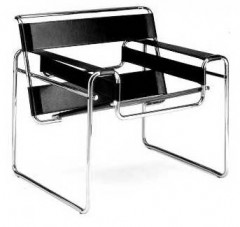
The women sat down on the chairs which the men brought and then started to dance by kicking, clapping hands, bringing their feet up, crossing legs. Then they all stood and turned around. The men set up the table and tablewares such as folks, plates, tea pots, cups. They were all Bauhaus design products, which were metal and simplified form. Women gathered with men at the table and pretended to have meals and drink tea. After that act, each man and woman made a pair and pretended to sleep on a bed lined up behind the table. It was like daily life simulation by Bauhaus products.
Then all of them danced on bed, and jumped from the bed to the floor. They danced what might be called "Bauhaus modern dance" on the stage floor. It looked like pantomime, ballet, bellydance, Nichibu, or waltz. Danced with very unique music blending of all sorts of janre such as classical, opera, jazz or anything else. Some of dancers started to dance with a bar, a ball and a fan. Masako used a fan to perform more accurate but more vivid version of Nichibu batterfly. The spectators were amazed with the show. They were never bored with this innovative show.
The climax was singing of German anthem by all performers, but only 3rd verse, which Bauhausler believe should represent tolerance of Germany.
Einigkeit und Recht und Freiheit
(Unity and justice and freedom)
Für das deutsche Vaterland!
(For the German fatherland!)
Danach lasst uns alle streben
(For these let us all strive)
Brüderlich mit Herz und Hand!
(Brotherly with heart and hand!)
Einigkeit und Recht und Freiheit
(Unity and justice and freedom)
Sind des Glückes Unterpfand;
(Are the pledge of fortune;)
|: Blüh' im Glanze dieses Glückes,
(|: Flourish in this fortune's blessing,)
Blühe, deutsches Vaterland. :|
(Flourish, German fatherland. :|)
When the show finished, all the spectators stood up and clapped their hands. It was standing ovation. Bauhausler were convinced that they would survive and even continue to strive!
On 28 February 1933, the Parliament building was burned in an arson attack. President Hindenburg declared national emergency for the defense of the nation. It was reported that the arson was done by a communist.
In March Nazi Party drafted Full Power Law that concentrated all the authorities of the state on one government, which would be Nazis. The law was passed by two thirds of majority. It was because some of opponent members were arrested before the passage of the law. Hitler officially became dictator of Deutschland.
To be continued to Chapter 9.
01:01 Posted in My novel | Permalink | Comments (1)
31 October 2009
Short Novel: Bauhausler, Chapter 7
A story of Japanese woman who experienced Bauhaus art and love romance in Berlin, early 1930's when Nazis came to power.
Please read Introduction first.
Some of her classmates were obviously communist. She heard former principal of Bauhaus school, Hannes Meyer was communist. Although she was against communism or Marxism, she made good friends with them. She just did not care because she was neither communist nor anything else. She was non-political. As long as she could have fun with them, she could get along with them.
She and her friends went to Berlin's amusement, called "Variete." That was variation of performances such as singing, dances, magic, and circus. They were different from traditional art like opera. That was why it was amusing. Berlin had great entertainment.
One day after classes, she just passed by one class room where Marcus Weiss and communist students gathered. She entered the room and was welcome by students there, though Marcus did not look comfortable. She pretended to listen to what they were talking, which she was not interested in and could never understood.
After the meeting, she talked to Marcus, "Meister, would you do me a favour?"
"What?" said Marcus furiously.
"I want to visit finest variete in Berlin if you know one." said Masako.
"Surprised! A high-society woman like you has interest in such cheap shows."
"Cheap shows?"
"You did not seem to join this communist group's meeting. Variete is something more like commoners' entertainment."
"That is why I want you to take me somewhere I can learn such commoners' entertainment. I am a student of advanced art so I need to learn any kind of arts." said Masako smiling.
"Great, then I will show you." said Marcus smilingly.
Marcus took her to Hanussen's Haus. It had a stage to show performances by Erik Jan Hanussen, known as Berlin's most famous hypnotist, mind-reading and prophet. She heard about his performance before but she and her friends were not interested in such occultic performances.
"Why did you take me here?"
"Well, this is the place where you can learn how deception took place."
Hanussen showed up. People clapped. He invited some of audience to the stage. He made them laugh and sing a song. He showed how he could easily manipulate people.
"He is brilliant, isn't he?" said Marcus.
"Yes, I think so, how did he do that?" said Masako.
"He knows the technique. But not just that, he knows who can be easily manipulated and picked up that kind of people among the audience to the stage, so the whole audience believes anybody can be easily manipulated by him. He not only manipulate people on the stage but also people looking at the stage."
"Kind of complicated" Masako wondered.
"That is how politicians do. Like Nazis. He actually works for Nazis, although he is Jew." said Marcus.
"What? Jewish magician works for Nazis?" Masako said a little bit louder.
"Be quiet, Masako. This is secret, even Nazis don't know about that. He is Czech Jew but pretended Danish aristcrat."
Masako was surprised at what Marcus said. Not just Hanussen being Jew, but how he got to know that.
Next show starts. Hanussen said "Now I would like to read your mind. Would anybody want me to read mind plus give advice as prophet?"
Masako stood up. Hanussen found her.
"Thank you, Young Lady. May I have your name?"
"I am Masako. I am from Japan." said Masako.
"Wow, a beautiful lady from Japan is asking me to read your mind. I am very honored to do that." said Hanussen delightedly.
Masako made a big smile to him. Then he started to stair at her very seriously.
"Well, I guess you are now in love with someone. He is very close to you. You don't know what he is thinking about you. You really want to know. Isn't that right?"
Masako responded by smiling, which just meant he was right.
"I can give you advice. Get close to him, you will have wonderful time with him. But as prophet, I can tell you the time with him won't be so long as you expect. Not because you and he can't but outside force intervenes."
Hanussen smiled confidently. Masako decided not to believe his words. Masako suddenly sat down and looked at Marcus. Marcus didn't seem to react to Hanussen's words.
The calender turned to December, Berlin got colder and colder. Christmas season was near.
After Marcus's class finished, he came up to Masako and said,
"Masako, I wonder if you are still interested in Jewish culture. I would like to invite you to my family's Hannukah Party."
"Hannukah?"
"It is Jewish version of Christmas." said Marcus smilingly.
"Great, I would love to be there." said Masako with big smile.
It was dinner time. Masako was invited to Marcus's uncle's house. Marcus's parents died a few years ago. His uncle and his uncle's wife and a little son were the only relatives to him. For Jewish people, ethnic minority in Germany, Hannukah was most important event to recognize the unity. His uncle, his son and Marcus wore yarmulke, small hat at the party.
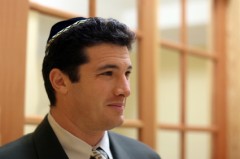
Hannukah was an eight-day Jewish holiday commemorating the rededication of the Holy Temple in Jerusalem at the time of the Maccabean Revolt of the 2nd century BCE. That day was eighth day. The candle stand with eight shining candles was placed on the table along with pancakes and other delicious meals.
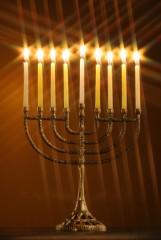
Uncle as host of the party, sang Jewish songs and prayed and then shared pancakes and meals with guests. It was like new world for Masako, non religious woman from Japan. She really touched new culture, which was holy, sacred and traditional. She was heart warmingly welcome by Marcus's uncle's family. She couldn't believe such people have been outcast of the society.
After the party, Marcus and Masako walked on the street alone. It was late at night. Masako felt like sharing love romance with Marcus. They happen to stop by a furniture shop which displayed Bauhaus's symboic furniture, Wassily Chair in the show-window case. The chair was one of Bauhaus's successful products sold in the market.

"We might not last so long." said Marcus suddenly.
"What are you talking about?"
"About Bauhaus. No matter how we are brilliant, we are losing support here. We have to survive. That is the main theme of our school today."
Masako looked at Marcus's face. He really looked very worried. She realized how he had been desperate because of his status as Jew, communist and a teacher of most advanced type of art.
"We should get support from as many people as possible because we are so brilliant. We can do that, don't we?" Masako shouted.
Marcus said, "Yes, we can. We should do something. Ummm..., oh, we will do Carnival event in February. What if we can do great exhibition and performances there, maybe we can do?"
"Carnival?"
"Annual event in Germany. Our school is scheduling to hold Carnival Fest to invite a lot of people outside Bauhaus. So we can show how brilliant we are!!
"How nice. We should do that. How about holding stage performance like Variete?"
"Oh, good idea! We used to have stage art class in Dessau, now after we moved to Berlin, we closed that. We can revive that as Carnival Performance. Let's do that! Students become dancers and singers. I can instruct that."
"I want to join that stage performance. I can dance, you know."
"Of course. You are one of the most brilliant students of our school."
Masako and Marcus were very excited.
To be continued to Chapter 8.
15:29 Posted in My novel | Permalink | Comments (0)
09 October 2009
Short Novel: Bauhausler, Chapter 6
Please read Introduction first.
Masasko was surprised to know Marcus was Jew. She never thought he was.
"Marcus, have you ever heard of the legend that some of your people also migrated to our country, Japan?"
"What are you talking about?" said Marcus. He seemed to be surprised with her reaction.
"It is a legend that about 2600 years ago, your people arrived in Japan from Israel and settled down there" said Masako delightedly.
"2600 years ago? Is it when 10 of 12 our tribes left Israel because of Assyria's occupation?"
"Interesting thing is that is when our imperial calender year starts. Meaning our majesty is a descendant of Jewish immigrant who established Japan."
Marcus became very curious about her story.
"We have some similarities. Japan's national religious faith, Shinto have some common customs and ceremonies."
"Interesting? What are these?"
"For example, in Japanese Shinto shrine, we wash hands at the entrance. There is a hand-wash place near the entrance. Once you get in, you first have to wash hands and then go to pray."
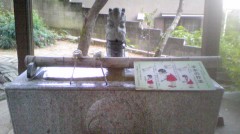
"Yes. the synagogue has the same thing. To purify before you pray."
"Don't you also use salt for purification?" asked Masako.
"Yes, on Sabath day, we spray salt on bread and eat it. You do the same thing?"
"Well, we don't eat salted bread but use salt to purify ourselves. One of typical things is we spray salt on people who came home back from funeral. The other typical thing is Sumo wrestlers spray salt on the fighting ring before a match. Sumo wrestling is originated from Shinto ceremony."
"Interesting. What else do we have in common?"
"Do you know Ark of Convent, which had been lost for thousands of years?"

"Yes, a famous bible story."
"Actually that exists in Japan as ritural ceremony or you might want to say "Fest"?"
"Festivals?"
"People carry the box which resembles Ark of Convent, called Omikoshi. It has golden birds on the top just like Ark of Convent. People carry it on their shoulders in group just like ancient Israeli did in the ceremony in front of King David. In some region people cross the river carrying the Omikoshi box as though your anscestors passed the Jordan river."
"Wow, suprised to hear. I have never been to Japan but I wish to see such things if I can visit there some day."
Marcus's response pleased her.
"Surely, you should come to Japan some day. We have common ground. We are connected" said Masako making a big smile.
Suddenly Marcus face turned sad and said to her.
"What does it matter if we have a common ground or difference? Connected or not?"
"Did I say anything wrong?" said Masako anxiously.
"No, you didn't say anything wrong. I mean, I just don't care whether we have similarities or differences. We are all humans anyway. We can share love or joy or anything else with one another" said Marcus.
Masako was shocked to see Marcus's response. She did not understand what he meant.
"Are you going to be free this afternoon? We have classes only in the morning. After lunch, I can take you to the place where anyone should have shared the same value. I really want to take you there."
Marcus said making a big smile to her. She thought she should go with him.
Masako was in Marcus's car driving to the city of Dessau, two hours from Berlin. That was where former school building of Bauhaus existed. They, two did not talk each other in the car. Marcus looked very serious and she got nervous by his face.
"There you see, that is where we used to teach and learn" said Marcus and he stopped the car.
She got out of the car and looked at it.

"Wow, this is very nice design" said Masako with surprise. The glass wall building impressed her very much.
"You like that. Yes, because you are Bauhausler and you have the sense of understanding."
Marcus said and was glad with her response.
"Your school is not using this building any more. Why left here?" asked Masako. Actually that was what she had been wondered even before she came to Berlin because at first she heard the school was located in Dessau but soon later it was relocated to Berlin.
"We were kicked out. We had to leave Dessau and restarted in Berlin as private institution."
"What happened? Who kicked out?"
"You know, Bauhaus was at first established in Weimar, 1919 by Walter Gropius. Later the school moved to Dessau in 1925. I joined the school since then. When the school was relocated to Dessau, we were very much welcome by the city councils as revolutionalist. The city gave us aid to construct this new modern style building and our Meister's house. But welcome atmosphere did not last so long."
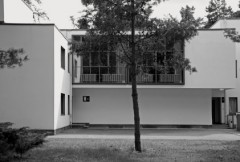
Marcus looked at her sadly.
"As time passed, growing nationalist movement took on us. The city council was dominated by nationalists." Marcus remembered harsh memories.
"You mean, Nazis?"
"Yeah, they took over the city's politics and banned aid to us. But it was not just by Nazis but many conservative people. They did not like us from the beginning. They called this building "Aquarium" or oriental sense of humor."
"Oriental sense of humor?" Masako was suprised with such furious words.
"Oh, no. I do not mean to offend you. That is how they expressed. They are not familiar with Bauhaus concept. You know, beauty in simplicity, minimalism. They could never understand that."
"Well, that is exactly orientalism, I think. Especially where I come from, we have the concept of seeking beauty in simplified things. It is called "Wabi-Sabi." It is a concept derived from the Buddhist assertion of the Three marks of existence (三法印, sanbōin), specifically impermanence (無常, mujō). We do not like too much decoration in architecture or houses. Finding beauty in simple thing and quiet atmosphere is most important matter in our culture. In that sense our culture might harmonize with Bauhaus" said Masako. She just came up with this wabi-sabi thing not to make him serious any more.
Marcus laughed and said,
"You always surprise me. ha, ha. I am glad to hear that. But to me Bauhaus is a new idea that can be shared with anybody in the world."
"But we are no longer welcome in your society."
"I beleive there should be a time anybody in the world can understand this concept. Whether you are westerner, Asian or anybody else. It benefits all the people in the world. Should be common ground for all of us."
Marcus showed firm commitment as Meister of Bauhaus. Masako found herself attracted to him.
To be continued to Chapter 7.
19:07 Posted in My novel | Permalink | Comments (0) | Tags: israel, judaism






